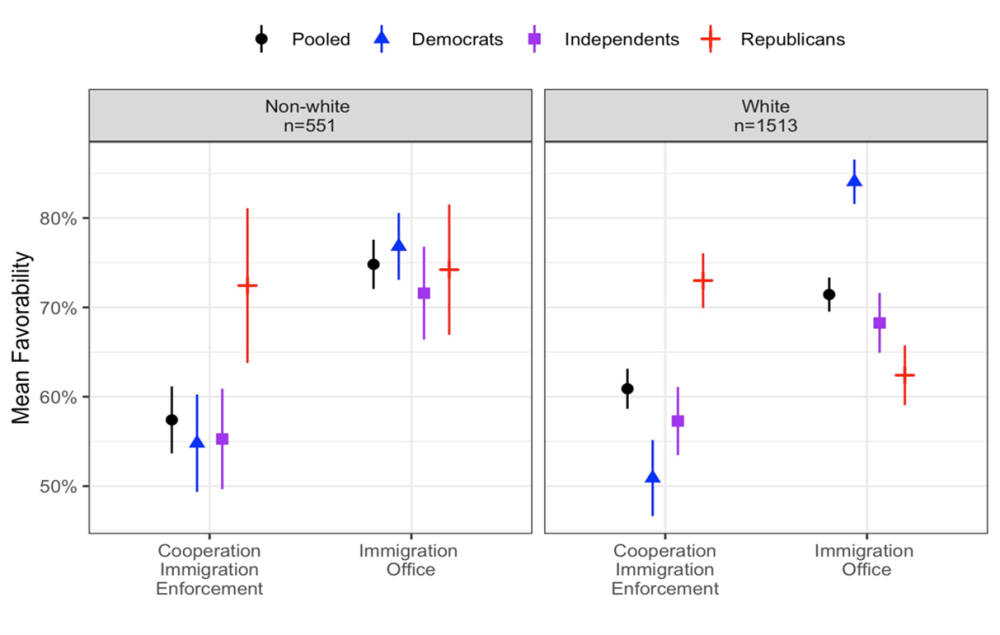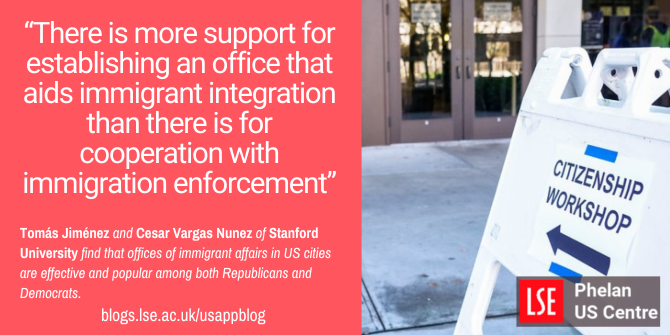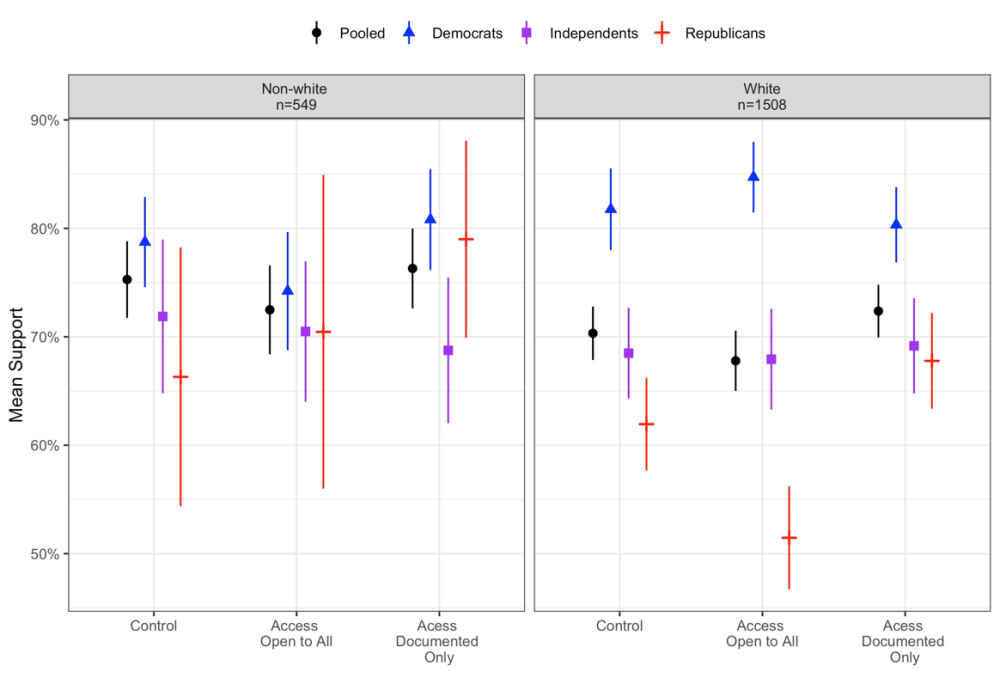
 While the US federal government has the primary responsibility for regulating immigration, US cities and states are also responsible for some aspects of immigration policy through measures and institutions such as offices of immigrant affairs (OIAs). In new survey research, Tomás Jiménez and Cesar Vargas Nunez look at how OIAs are perceived by Americans, finding that they enjoy a high level of support regardless of the legal status of the immigrant population they serve and regardless of whether respondents support the Republican or Democratic party.
While the US federal government has the primary responsibility for regulating immigration, US cities and states are also responsible for some aspects of immigration policy through measures and institutions such as offices of immigrant affairs (OIAs). In new survey research, Tomás Jiménez and Cesar Vargas Nunez look at how OIAs are perceived by Americans, finding that they enjoy a high level of support regardless of the legal status of the immigrant population they serve and regardless of whether respondents support the Republican or Democratic party.
Immigration policy is the legal responsibility of the US federal government. It is also the federal government that most people think of when they think of immigration policy. However, in the last three decades, US cities, counties, and states have been making immigrant policies designed to either repel and expel immigrants or integrate them into the local context. The number and range of local policies have grown dramatically in the last 25 years. But since 2012, new integration policies have far outpaced those that repel and expel. The policy case made for both kinds of measures is that immigrants either ruin or renew the quality of life, the economy, and social cohesion. How do those arguments stack up to public opinion of cities that enact these measures?
Examining public sentiment towards offices of immigrant affairs
In new research, we answered that question, focusing on two contrasting local policy responses: cooperation with federal immigration enforcement, which can entail training local law enforcement to help carry out immigration enforcement or cooperation with detention and deportation with federal officials, and the establishment of offices of immigrant affairs (OIAs), which implement and manage services to help immigrants integrate. These offices have been growing in number in the last 20 years. As of 2021, there were about 73 city or county offices in the United States.
To understand perceptions of cities that took either of these policy approaches we conducted two survey experiments in October of 2021 in which we asked a national sample of 2107 individuals about how favorably they viewed cities that took one of these approaches and about views of OIAs that served different legal status segments of the immigrant population. We also gathered information about individuals’ characteristics, including political orientation, level of education, age, and ethnoracial background.
In our first experiment, we presented respondents with a fictitious “American Midwest” city that “has great schools, a growing economy, and affordable housing. In response to a growing immigrant population, local leaders recently passed a city ordinance.” We then told half of the respondents that local leaders had passed a measure that “creates an office of immigrant affairs that helps immigrants integrate into the community;” the other half of the respondents that the ordinance is “to cooperate with federal immigration enforcement by helping to identify and detain immigrants for deportation.” We then asked all respondents how favorably they viewed the city.
The results from our first experiment, shown in Figure 1, suggest that respondents view a city that moves to integrate immigrants more favorably than one that cooperates with federal immigration enforcement. There are important differences by ethnoracial background (we pooled Black, Latino, and Asian Americans due to our sample size) and political party identification.
Figure 1 – Favorability towards the city across partisanship, ethnicity, and experimental group.

Note: Includes 95 percent confidence intervals
Both white and Black, Latino, and Asian American respondents have a more favorable view of a city that establishes an office of immigrant affairs compared to one that cooperates with immigration enforcement. The same is true for Black, Latino, and Asian American respondents who identify as either Democrats or independents. Black, Latino, and Asian American Republicans generally have favorable and similar views of both kinds of cities. Among whites, Democrats and independents view a city that establishes an OIA more favorably than one that cooperates with immigration enforcement. White Democrats have the most favorable views among any ethnoracial/partisan group in our study, reflecting larger trends. White Republicans, on the other hand, have more favorable views of a city that cooperates with immigration enforcement than one that establishes an OIA. We hasten to note that 62 percent of white Republican respondents, the group most associated with anti-immigrant views, still have a favorable view of a city that establishes an OIA.

“Seattle Office of Immigrant and Refugee…” (CC BY-NC 2.0) by Seattle OIRA
We conducted a second experiment about OIAs themselves to see whether views depend on the legal status of the immigrants the OIA would serve (roughly one-quarter of the foreign-born population in the United States does not have legal documentation to be in the territory). We asked the same sample of survey respondents to imagine that their own city was considering creating an OIA that “would be in charge of: 1) teaching classes to help immigrants learn English, 2) connecting immigrants to local public services, 3) helping integrate immigrants in the local community.” A third of the respondents were in a control group and told nothing about the legal status of the potential beneficiaries of the OIA. Another third was informed the office would provide “aid to immigrants regardless of legal status.” The remaining group was told the OIA would provide “aid only to immigrants that are in the country lawfully.” Figure 2 shows our results.
Figure 2 – Mean support towards OIA across ethnicity, partisanship, and experimental group

Note: Includes 95 percent confidence intervals
OIAs enjoy a high level of support regardless of the legal status of the immigrant population the OIA would serve and respondent political-party identification. Among white respondents, those who identify as Democrats are the most supportive, while Republicans are the least supportive. Notably, the floor of support among white Republicans remains above 50 percent (when the OIA is open to all immigrants regardless of legal status), and support approaches 70 percent when the OIA is open only to immigrants in the United States with legal status.
Our findings show that when it comes to local involvement in immigration policy, there is more support for establishing an office that aids immigrant integration than there is for cooperation with immigration enforcement. And the support is relatively high regardless of the legal status of the immigrants that the OIA serves. To be sure, our findings bear the imprint of partisan divisions defining US public opinion on various issues, including immigration. But they also show that those divisions on immigration are not the wide gulf that appears in debates among political elites. Indeed, the floor of favorability of a city that establishes an OIA among white Republicans is 62 percent, and support for establishing an OIA that serves immigrants regardless of legal status is above 50 percent.
Considering our findings alongside other research showing that integration measures foster equity between immigrants and established populations, OIAs are potentially a rare immigration policy that is effective and popular.
- This article is based on the paper, ‘Going Local: Public Attitudes toward Municipal Offices of Immigration Affairs’, in American Political Science Review.
- Please read our comments policy before commenting.
- Note: This article gives the views of the author, and not the position of USAPP – American Politics and Policy, nor the London School of Economics.
- Shortened URL for this post: https://bit.ly/3RvBRCD






